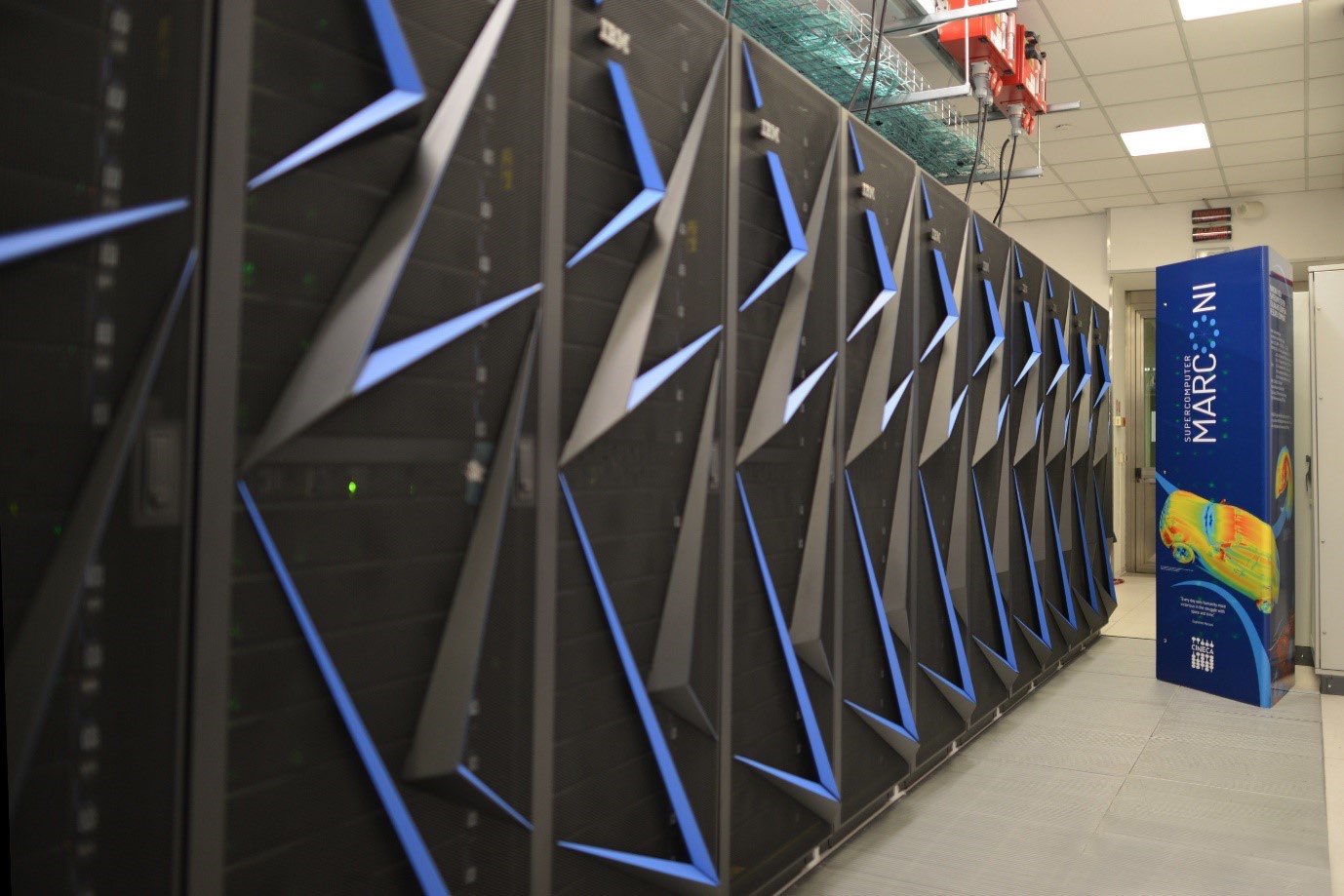Friday, 16 April 2021
One of the world’s most powerful supercomputers is being used by chemists at the University of Nottingham to accelerate research into the discovery of new medicines.
The School of Chemistry has been granted access to Marconi100, the eleventh most powerful machine in the world according to the most recent Top500 ranking. The Marconi100 supercomputer is at CINECA in Italy.
 Marconi100 Supercomputer at CINECA in Italy
Marconi100 Supercomputer at CINECA in Italy
Marconi100, based in Italy, was built by IBM using its POWER9 technology and NVIDIA V100 Tensor Core GPUs, and according to measurements conducted by CINECA, Italy's national high-performance computing consortium, offers nearly 32 theoretical peak petaFLOPS of computing power, or up to 32 quadrillion calculations per second. The researchers have been awarded 30 million core hours over 12 months on Marconi100 by the Partnership for Advanced Computing in Europe (PRACE).
Following competitive and robust assessment researchers have been granted access to Marconi100 and will exploit the throughput of top-end high performance computing coupled with effective “active learning” strategies. They will use these to explore chemical space to shorten the time required to find potent compounds that are straightforward to make in a chemical laboratory and which have a profile of physicochemical properties appropriate for a drug.
Professor Jonathan Hirst, a Royal Academy of Engineering Chair of Emerging Technologies in the University’s School of Chemistry is leading the project — working in a collaborative EPSRC-funded Prosperity Partnership with colleagues at the Universities of Nottingham and Strathclyde.
Our project will harness the power of both machine learning and of physics-based molecular simulation to accelerate the discovery of compounds with predicted therapeutic values as leads in drug discovery efforts.
The experience Professor Hirst’s team has accrued using the University of Nottingham’s High Performance Computer and the regional tier-2 facilities, such as HPC Midlands+ and JADE, has been invaluable in providing the platform needed to develop this ambitious project. The University’s High Performance Computing Facility offers academics from across the institution the opportunity to use a cluster of powerful computers that can work together to drastically reduce the time required to perform large scale calculations. It has the potential to take a calculation that would last a year on a single PC, and provide the answer in a few hours. Alternatively, it can do many hundreds of smaller calculations simultaneously, depending on user requirements.
The University of Nottingham has had a strong commitment to High Performance Computing for many years, keeping its researchers at the forefront of the computational aspects of their disciplines. Nottingham’s own facility not only provides key research infrastructure, but also serves as a springboard for access to national and European supercomputers.
Proposals for time on European supercomputers are subject to competitive and robust assessment — in the most recent round, technical experts from PRACE evaluated over 60 submitted proposals, followed by a review of scientific excellence by three independent reviewers.
Story credits
More information is available from Professor Jonathan Hirst on Jonathan.hirst@nottingham.ac.uk or Jane Icke, Media Relations Manager for the Faculty of Science at the University of Nottingham, on +44 (0)115 951 5751, jane.icke@nottingham.ac.uk
Notes to editors:
About the University of Nottingham
Ranked 24 in Europe and 15th in the UK by the QS World University Rankings: Europe 2024, the University of Nottingham is a founding member of Russell Group of research-intensive universities. Studying at the University of Nottingham is a life-changing experience, and we pride ourselves on unlocking the potential of our students. We have a pioneering spirit, expressed in the vision of our founder Sir Jesse Boot, which has seen us lead the way in establishing campuses in China and Malaysia - part of a globally connected network of education, research and industrial engagement.
Nottingham was crowned Sports University of the Year by The Times and Sunday Times Good University Guide 2024 – the third time it has been given the honour since 2018 – and by the Daily Mail University Guide 2024.
The university is among the best universities in the UK for the strength of our research, positioned seventh for research power in the UK according to REF 2021. The birthplace of discoveries such as MRI and ibuprofen, our innovations transform lives and tackle global problems such as sustainable food supplies, ending modern slavery, developing greener transport, and reducing reliance on fossil fuels.
The university is a major employer and industry partner - locally and globally - and our graduates are the third most targeted by the UK's top employers, according to The Graduate Market in 2024 report by High Fliers Research.
We lead the Universities for Nottingham initiative, in partnership with Nottingham Trent University, a pioneering collaboration between the city’s two world-class institutions to improve levels of prosperity, opportunity, sustainability, health and wellbeing for residents in the city and region we are proud to call home.
More news…